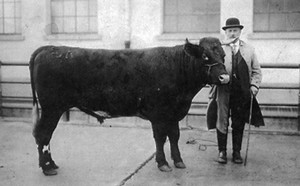Lekoudesch (Jewish Cattle Traders Jargon)
Lekoudesch :: Language-genetic affiliation
Lekoudesch (also Lechoudesch, Lottegorsich, Lothekolisch, etc.) is the name given by users to a special vocabulary mainly of Hebrew origin that was used as means of in-group and secret communication among Jewish traders in rural areas in Germany and neighbouring countries and regions (the Netherlands, Alsace and Lorraine, Switzerland). The most frequent use of Lekoudesch was in the context of the cattle trade, at cattle markets and among butchers. The original group of users were Jewish merchants who had access to the vocabulary of Hebrew scriptures through religious education and who drew on this knowledge to replace everyday expressions in order to conceal their communication from group-outsiders. In part, secret communication among partners in the presence of a client provided an advantage during trade negotiations. But the function of the in-group code was social as well as. The Hebrew words, pronounced in the so-called Ashkenazic way (that is, integrated into German phonology), were simply inserted into local and regional varieties of German. While there is some evidence of local varieties, by and large the same Hebrew-derived vocabulary was used by Jewish traders in various regions, indicating a kind of multi-regional speech community. The name of the speech form is a euphemism based on Hebrew loschen ha-koudesch 'the holy tongue', the traditional term for the Hebrew language of the scripture.

Lekoudesch :: Historical distribution Map
Attestation of Lekoudesch in the form of documentation of the speech of Jewish merchants comes from the province of Eastern Friesland in northwest Germany, the Netherlands, Alsace, the Rhine area and Hessia, southwest Germany and Bavaria, and Switzerland, and this seems to have constituted the original area in which the code was used, though it may well have been more widespread and in use in eastern parts of Germany too. Use of Lekoudesch declined in the first decades of the twentieth century as a result of the rapid urbanisation of the Jewish population in Germany following the emancipation, but its use is still attested in rural communities in the inter-war period. None of the rural Jewish communities survived in Germany after World War II, and the original Lekoudesch perished or dispersed along with its speakers. However, the vocabulary survived for one further generation in a small number of communities in southwest Germany where it had been acquired by non-Jewish young men who were employed in the cattle industry, and who maintained it as a kind of in-group identity badge and social marker. The samples documented on this page are believed to be the last recordings with speakers who had access to the original form of Lekoudesch as used by Jewish cattle traders. In the village of Schopfloch in Bavaria, attempts were made in the 1980s-1990s to promote awareness of a closely-related variety named Lachoudesch through evening classes and the publication of teaching and learning materials.
Lekoudesch :: General structural characteristics
Lekoudesch is based on the insertion of Hebrew-derived words into dialectal conversation in German. While in principle it appears that any Hebrew expression that was likely to be understood by interlocutors could be selected, in practice most speakers appear to have favoured a fixed inventory of around 300-400 words. Some of those were creative compositions that emerged through usage in Lekoudesch itself and were not simply copied over from Hebrew sources, for example schocha majim lou kuhlef 'black coffee' (literally 'black water no milk'), or kassirrosch 'pig-head'. Such compositions always follow German word order, rather than Hebrew word order. The vocabulary consists almost entirely of content words (nouns, verbs, adjective and some adverbs), and the use of grammatical lexicon is limited. Among the more widespread Hebrew-derived function words is the negation particle lou, numerals, and the existential verb schäff- 'to be, to exist, to be present', from Hebrew šev- 'to sit'. While word and sentence structure usually follows the rules of (dialectal) German grammar, there is an occasional tendency to simplify phrases, as in alle gimmel dof 'all three [are] good'.
Lekoudesch :: References to Yaron Matras's work
- 2000. Mixed languages: A functional-communicative approach. [Keynote article accompanied by 12 peer commentaries] Bilingualism: Language & Cognition 3-2, 79-99
- 1997. Zur stilistischen Funktion der Sondersprache Lekoudesch in südwestdeutschen Erzählungen. [The stylistic function of the special language Lekoudesch in narratives in southwest German dialect] In: Löffelad, Peter, & Ruoff, Arno (eds.) Syntax und Stilistik der Alltagssprache. Tübingen: Niemeyer. (Idiomatica 18). 97-106.
- 1996. Sondersprachliche Hebraismen. Am Beispiel der südwestdeutschen Viehhändlersprache. In: Siewert, Klaus (Hg.) Sondersprachen: Rotwelschdialekte. Wiesbaden: Harrassowitz. 43-58.
- 1991. Zur Rekonstruktion des jüdisch-deutschen Wortschatzes in den Mundarten ehemaliger "Judendörfer" in Südwestdeutschland. Zeitschrift für Dialektologie und Linguistik 58:3, 267-293.
- 1988. Lekoudesch: Integration jiddischer Wörter in die Mundart von Rexingen bei Horb. Mit vergleichbarem Material aus Buttenhausen bei Münsingen. Arbeiten zur Mehrsprachigkeit 33/1988. Hamburg: Germanisches Seminar.
Lekoudesch :: Links to other websites
- Language Contact Manchester Yaron Matras' case study on Lekoudsch
- ABC Radio National Lingua Franca's interview with Yaron Matras Dec 2007
Lekoudesch :: Sound samples
- A farmer in the village of Rexingen (Black Forest) giving examples of Lekoudesch (recorded in March 1984)
- The daughter of a farmer in the village of Buttenhausen (Swabian Alps) recounting words acquired from local Jews that are in use in her family (recorded in July 1984)
- Group of retired men in Rexingen (Black Forest) using Lekoudesch in anecdotes (recorded in June 1984)